Activate high contrast
To main content

‘The role of data will only become more important’
‘The role of data will only become more important’ Alessandro Bozzon discussing the role of data within AMS Institute By: Jurjen Slump Chatbots that provide the public with real-time information on gridlocks in the city. A bridge, connected to the Internet of Things (IoT), that records the number of people crossing it. A database containing the precise location of all the urban objects in the city. Data play a big role in cities - and will only become more important. Obviously, data also play a significant role within AMS Institute’s projects. “Ultimately, it’s all about good decision-making”, says data scientist Alessandro Bozzon. He heads AMS Institute’s Urban Data Science Team. “You want to know what’s going on in the city, what kind of policy needs to be pursued. And for this you need a lot of information.” The goal is to use data to improve the quality of life. “Our job is to enable citizens, administrators, and scientists to extract actionable knowledge from data.” SocialGlass Bozzon and his team are involved in all projects involving data. They ensure that the data are collected in an optimal manner, so that they can be properly integrated within various applications. In addition, the Urban Data Science Team develops ground-breaking innovations. A well- known project called ‘SocialGlass’ provides a readily available technical infrastructure to integrate in real time streams of urban data, for instance from social media applications such as Twitter and Instagram. On their smartphones, visitors and residents generate gigabytes of information each day about their activities in the city, and about their (social) environment. SocialGlass is a tool that enables policy makers to analyse this information in real time. Technologies such as machine learning and spatial data mining are used for this. As a result, it is possible for traffic engineers to work towards the prediction of the course of visitor flows in the city. SocialGlass was successfully used for instance, to monitor visitor crowds during the SAIL Amsterdam event in 2015, in a collaboration with the ALLEGRO team led by professor Serge Hoogendoorn. ALLEGRO is another project of the AMS Institute, aimed at establishing a comprehensive theory of active mode behaviour, considering the different behavioural levels for pedestrians and cyclists in cities. Chatbots One of the components of SocialGlass is a chatbot that answers visitors’ questions about, for example, how busy a particular location in the city is. The new feature of the chatbot is that it can ask users questions in return. This also provides valuable information for the city and other users. All these data are combined and analysed in the City Simulation Lab where, for example, tourist flows can be simulated and predicted with high accuracy. Our job is to enable citizens, administrators, and scientists to extract actionable knowledge from data Privacy Of course, collecting all these data will have privacy implications, but this aspect has been given careful consideration. Bozzon emphasises that everything is in accordance with the new European privacy regulations. What’s more, the data are processed in a privacy- by-design manner, so that it cannot be traced back to individuals. Bozzon’s team includes about 10 people. Also, he is an associate professor affiliated to the faculty of Electrical Engineering, Mathematics and Computer Science at Delft University of Technology. At the university, another 10 people are working indirectly on topics related to AMS Institute’s projects. This includes research on crowd computing and human-centred artificial intelligence, i.e. intelligent systems working together with people. Catalyst The partnership within AMS Institute is an amazing catalyst for collaboration, both with other knowledge partners and companies and within Delft University of Technology. “We work together with the Civil Engineering, Industrial Design and Engineering, and Architecture and Built Environment faculties”, he elaborates. “Since we are all working on issues with tangible impact on the life of people, all the usual collaboration barriers disappear.” The future Bozzon expects data to become ever more important in the next few years. “We are still in the early stages in terms of the role that data are going to fulfil in the decision-making process.” The Internet of Things is also expected to take a big leap forward, with increasingly intelligent devices generating valuable data. Consider, for example, self-driving cars that supply data for mobility issues. Or the previously mentioned MX3D Bridge, where IoT sensing infrastructure developed by the team of professor Gerd Kortuem will provide information about the bridge’s status and usage, in real time. Artificial intelligence will also claim a bigger role, so there will have to be a strong focus on ethical issues. “You need to make sure that people don’t feel excluded.” Education In short: there’s enough to keep Bozzon and his colleagues busy in the coming years. In addition, it is important that the field of education focuses sufficient attention on data and how to handle them. “At Delft University of Technology and within AMS Institute, we’re training the next generation of engineers and professionals. Data are the alpha and omega within this field. It is therefore important for students to understand how to handle these data in a correct and responsible manner. This is just as important as knowing how to program software – maybe even more so.” twitter linkedin

Education: Master programme Metropolitan Analysis, Design and Engineering
Education: Master programme Metropolitan Analysis, Design and Engineering Living labs play a central role in master’s degree programme By: Jurjen Slump Students can obtain a master’s degree in Metropolitan Analysis, Design and Engineering (MSc MADE). They are taught right in the heart of the city, and living labs have an important role to play here. We educate urban engineers who, in the complex and confusing world of major cities, are capable of contributing to changes, have the courage to make decisions and are aware these often have unexpected consequences”, explains Arjen Zegwaard from Wageningen University & Research (WUR). Together with Maurice Harteveld, his counterpart from Delft University of Technology, he leads the MADE education programme. “All of the students share the same drive: a commitment to improve the city and make it more sustainable.” Living lab The master’s programme is an alliance between WUR and Delft University of Technology and focuses on the topics of the AMS Institute. Students attend courses on metropolitan challenges and metropolitan solutions. The living lab plays a central role. “Whereas an internship is compulsory on many degree programmes, we rather like to focus on living labs”, says Zegwaard. “It enables us to get to a feasible solution more quickly”, says Harteveld. Students work with all stakeholders on a problem with lots of unanswered questions. The keyword here is ‘co-creation’: collaboration is key at all stages of learning. “No single actor can make metropoles move in a specific direction”, Harteveld explains. “Metropolitan solutions require cooperation between knowledge experts, as well as between city, citizens and civil society.” This approach does justice to the interconnected nature and complexity of today’s problems, Zegwaard states. “It is 21st-century engineering at its best.” Metropolitan solutions require cooperation between knowledge experts, as well as between city, citizens and civil society Generalist specialists Students who have completed the master’s programme are ‘generalist specialists’ and are able to pursue a wide range of careers. From advising municipalities, to running a business in the field of sustainable applications for metropolitan regions, explains Zegwaard. Harteveld calls them ‘metropolitan innovators’: experts able to build bridges between different stakeholders. Synergy The alliance between WUR and Delft University of Technology results in ‘amazing synergy’, say both Zegwaard and Harteveld. The lecturers who teach the programme courses come from different backgrounds, which results in a very creative and innovative style of teaching. Zegwaard: “They clearly enjoy what they are doing and that rubs off on the students.” MOOCs, Summer Schools, and more In addition to the MSc MADE, Delft University of Technology and WUR also develop MOOCs and Summer Schools for AMS Institute, while courses for business community and government professionals are also in the pipeline. twitter linkedin
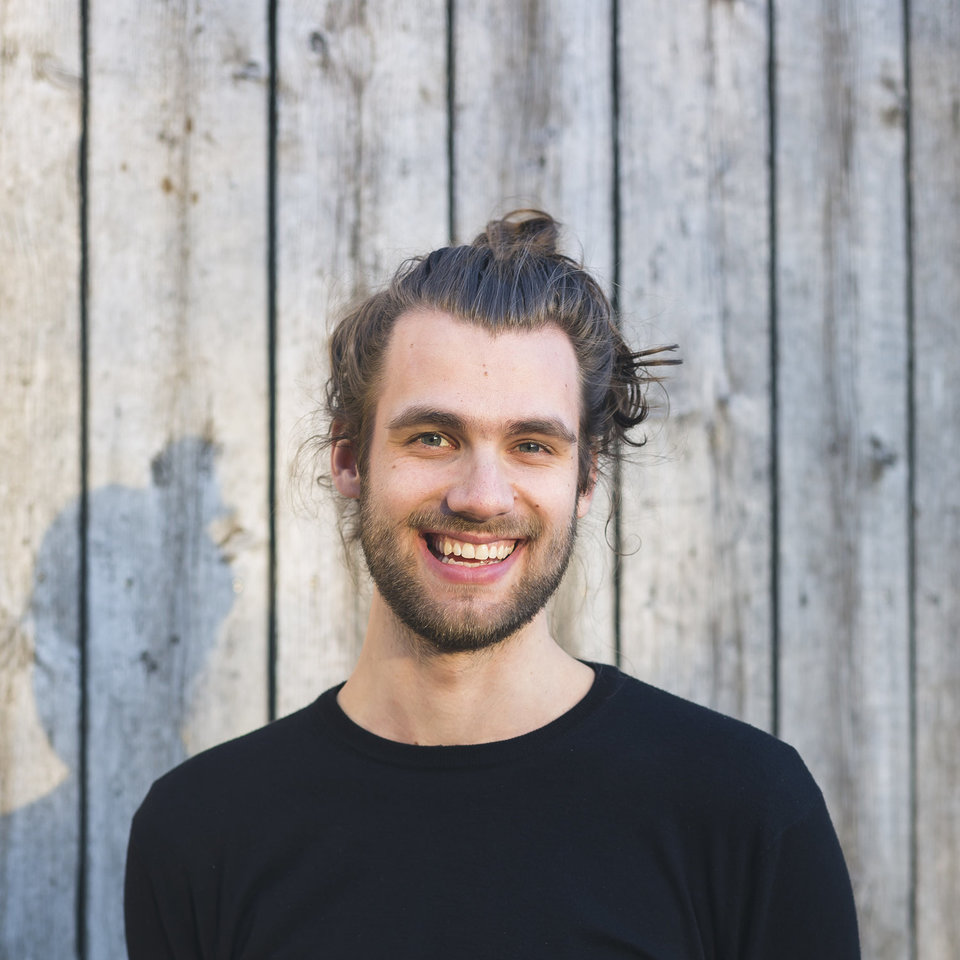
‘I really enjoy being at the vanguard, where all the innovation is happening’
‘I really enjoy being at the vanguard, where all the innovation is happening’ Student Laurens van der Wal on the MADE master’s degree programme By: Jurjen Slump As a bachelor student of Architecture and the Built Environment at Delft University of Technology, Laurens van der Wal and his sister Lena founded the design agency Walden Studio, which develops sustainable design on all levels from the urban scale, to ‘tiny houses.’ For his master, he opted for the MSc MADE. Van der Wal is now in his second year, and he is enjoying the programme. “If you really want to create sustainable products, you first need to understand what the underlying problem is.” For Van der Wal, MADE combines the best of both worlds: it is not only strongly application- driven and targets the real problems faced by major cities, but also offers a theoretical scientific basis with a focus on sustainability. This ‘deeper knowledge’ is needed in order to have a genuine impact. “At Walden Studio , we realised that the architect is often involved too late in the creation process of truly sustainable projects”, says Van der Wal. “You need to be the party that takes the first initiative. In order to do that, you have to fully understand the problems involved.” Reusing waste materials The Master’s degree programme that takes place at the AMS Institute offers Van der Wal the knowledge and skills he needs. Consider, for example, the waste disposal system in Amsterdam, which fascinates Van der Wal. “In the MADE courses, you start by looking at how the system fits together at the meta-level - how to recycle more in the city - before going on to see how it works in Amsterdam. You identify all the actors involved and try to link together all the different interests that are at play”, he explains. Living lab Van der Wal is currently conducting research in a living lab on the subject of waste. It is part of the AMS Institute’s WASCOM project, which is investigating how toilet paper, for example, that ends up in the sewer can be reused as a raw material. Cellulose can actually be extracted from toilet paper, which can then be reused in bio-composites and other construction materials, such as façade panels. Some of the other involved parties are biocomposite producer NPSP, Waternet and ChainCraft. You need to be the party that takes the first initiative. In order to do that, you have to fully understand the problems involved Vanguard The 27-year-old student is among the first cohort of MADE students. This means that some things are new for everyone, but this is certainly not holding him back. “I actually enjoy being at the vanguard, where all the innovation is happening.” Van der Wal is still unsure what he plans to do next. But it is quite likely that Walden Studio will ultimately become a ‘sustainable project developer’, enabling his sustainable housing solutions to become part of a completely sustainable environment. twitter linkedin
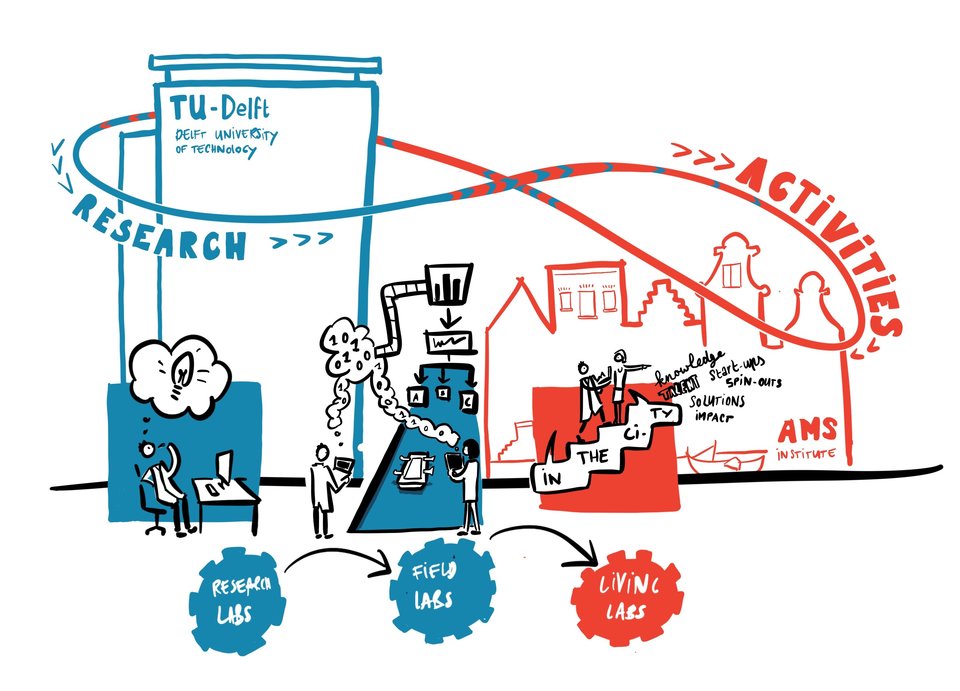
Addressing metropolitan challenges: “typical engineering work”
Addressing metropolitan challenges: “typical engineering work” Vice-Rector Magnificus Rob Mudde talks about the importance of AMS Institute By: Jurjen Slump Together with Wageningen University & Research and the Massachusetts Institute of Technology Delft University of Technology forms the scientific heart of AMS Institute. Participating in the institute is important to Delft University of Technology, says Rob Mudde, Vice-Rector Magnificus and Vice- President for Education on the Executive Board. AMS Institute is part of his portfolio. “To solve urban problems, we need to be in the city ourselves.” Urbanisation “By 2050, 70 percent of people will live in cities. If we consider where in society most of the problems arise and where living conditions of people might be improved, we will mostly look at urban environments. The extent of urbanisation will only increase, as well as its associated challenges. Take, for example, the food supply system: 30 percent of goods transport in Amsterdam are food-related. That is an incredible amount of transport movements within the city. We need to do something about this; it can be done in a smarter way. We want to be able to supply the shops without the city becoming gridlocked. Offering a solution to this means we will make an immediate contribution. Scientists find these challenges immensely interesting. Many people at Delft University of Technology are fascinated by it.” In Amsterdam, but typically Delft “The way we work within AMS Institute is representative of the Delft approach: it’s typical engineering work. Because we think in terms of solutions. In a big city, there are certain preconditions to be taken into account. Traffic and residents need to be able to move around at all times. We cannot simply close off a bridge or a road. Engineers are used to this way of working and that’s also the reason why we have to be physically present in Amsterdam. One cannot recreate this complexity in a lab - we have to let ourselves be inspired by the city, listen to the city governance, to its civil servants, and its citizens. That’s why we find it perfectly logical to leave the campus in Delft and come to Amsterdam: the city is a living laboratory.” Complexity “For the same reason, it is also essential to get the scientists out of the TU Delft Campus labs. It’s often about practical applications, so we need to seek out actual social complexities. We cannot simply strip it down to the core problem and try to solve it in ‘splendid isolation’ inside a laboratory, because then we will lose sight of some of its complexity. That’s why we collaborate in the AMS Institute.” The research carried out by the AMS Institute in living labs and the activities performed within Delft University of Technology perfectly complement each other
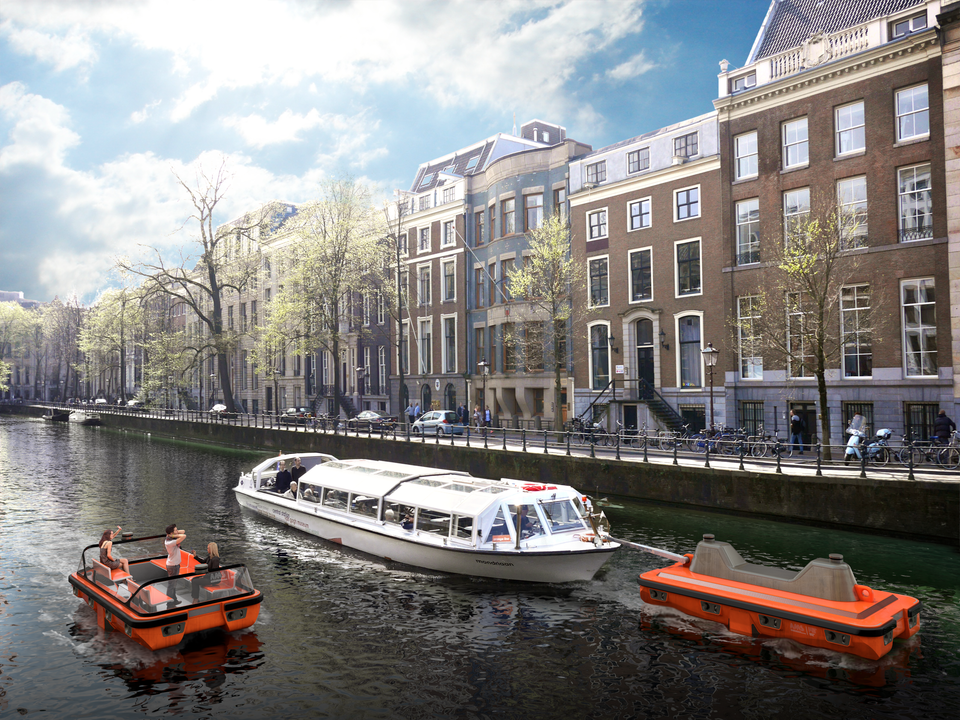
‘AMS Institute delivers concrete solutions for the city’
‘AMS Institute delivers concrete solutions for the city’ Interview with City of Amsterdam alderman Udo Kock By: Jurjen Slump AMS Institute was established at the initiative of the City of Amsterdam. Udo Kock, the alderman responsible (Economic Affairs, D66), has therefore been carefully monitoring the institute’s numerous research projects. In an interview with Home of Innovation, he explains how impressed he is with what the institute has achieved so far. The Roboat. Even Kock is fascinated by the wealth of possibilities offered by the autonomous boat. “Making a robot boat hat can navigate through the canals is not actually that complicated in itself”, he explains. “But it does become interesting when you consider the potential applications: collecting domestic waste, carrying construction materials and solving other transport and mobility problems”. It is even possible that, in ten years’ time, when the Roboat will have been developed into a commercial product that navigates the local waters, Amsterdam’s canals could again be used intensively for goods transport. “Just like three centuries ago”, says Kock. Smart city It was the City Council that, in 2012, called for the establishment of a technological Institute in Amsterdam to focus on the metropolitan challenges faced by the city, explains Kock. “How can you ensure that the city can continue to grow in a responsible way, without compromising on quality of life? How do you develop new forms of mobility? How do you implement the smart city concept? All of this is so complex that we cannot develop solutions in city hall alone.” It was clear from the outset that education and research on metropolitan issues needed to come together within the institute. It called for an interdisciplinary approach, centred around practical problems, with the aim of stimulating business through start-ups working on solutions. The City of Amsterdam invested € 50 million in the institute for a 10 year period. Six years on, the first prototypes of the Roboat are now sailing through the canals. As the person with ultimate responsibility, Kock receives regular updates on the usable and interesting solutions that are emerging from the research. “I use what I learn in my discussions with colleagues on these issues. So many great and interesting things are happening!” What makes AMS Institute special, and therefore relevant for major cities, is that the problems being researched actually come from the real world of practice Real-time crowd control The Roboat may be a prototype, but SocialGlass, another innovation from the AMS Institute, has already proved its worth. It is a real-time crowd control system. “We put it to use during SAIL Amsterdam in 2015. Thanks to the system, we were able to point people in a particular direction using real-time information signs.” This involved hundreds of thousands of people. “You can see that it works. The system is now also being deployed in the red-light district and during other large-scale events, such as King’s Day.” Export product Other major cities could benefit from these innovations. “Barcelona, Brussels, Paris. They are facing similar problems with mobility, traffic and pedestrian flows.” The City has appointed a chief technology officer, who also liaises with other cities. Through him, Amsterdam’s innovations are shared with other global cities. “What makes the AMS Institute special, and therefore relevant for major cities, is that the problems being researched actually come from the real world of practice”, says Kock. You can only achieve that if you are also based in the city.” Intensive collaboration with the City of Amsterdam is also important to ensure that the right research is conducted. “We meet every two weeks to discuss progress in projects and explore how we can use the research results.” Education Kock also has plenty of praise for the educational programme set up by the AMS Institute, with its Master’s ‘What makes AMS Institute special, and therefore relevant for major cities, is that the problems being researched actually come from the real world of practice’ degree programme MADE and various summer schools. “It attracts students from across the world. One of the most recent summer schools involved some 70 students from 29 different countries.” Extremely international. “It is also a very effective way of putting Amsterdam on the map as an interesting place for international students.” Concrete solutions The AMS Institute is an academic success and is also attracting many international students to the city. But ultimately, it is all about the results, emphasises Kock. “It is delivering concrete solutions for problems that Amsterdam would like to see addressed as quickly as possible.” The process of knowledge valorisation is never easy, but the AMS Institute is certainly on the right track, concludes Kock. “This is a model that works.” twitter linkedin
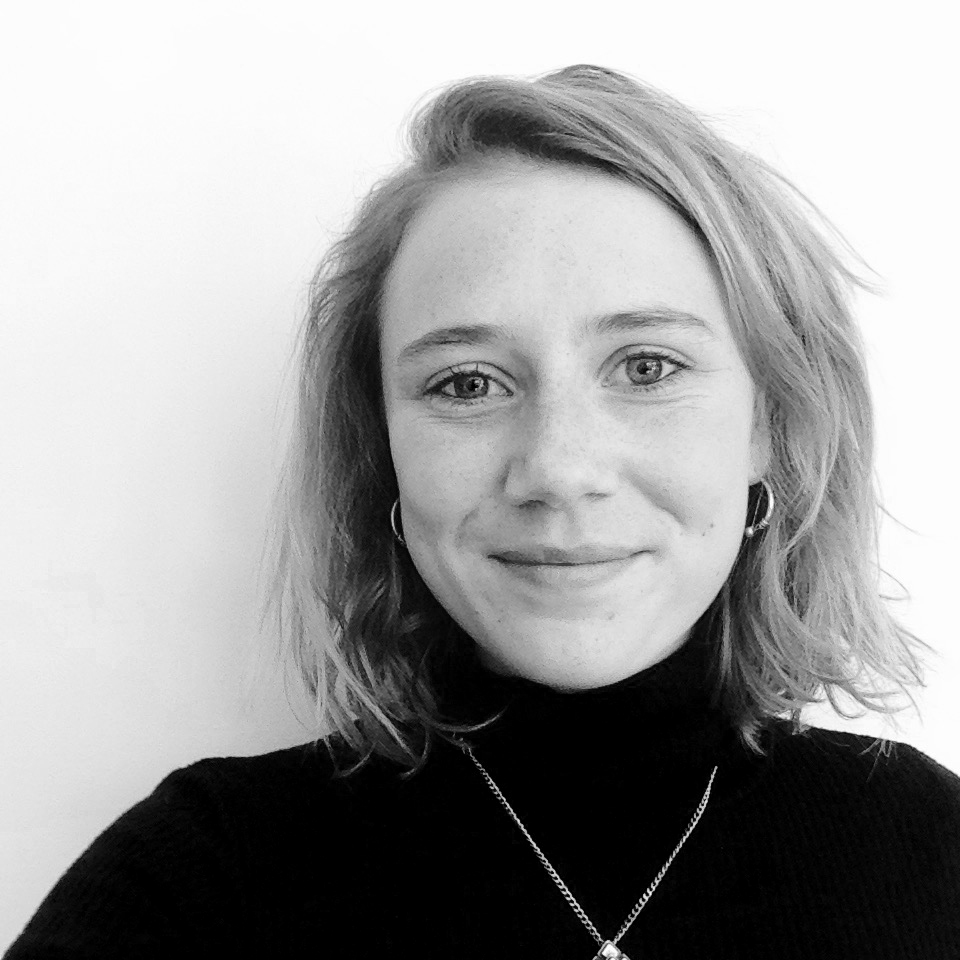
'I always wanted to work on the city of the future'
'I always wanted to work on the city of the future' Tamara Streefland discusses the role of the industry community within the AMS Institute By: Jurjen Slump As a sustainability consultant at Metabolic, Tamara Streefland is closely involved in several projects of AMS Institute. She believes that the involvement of the industry is important to ensure that innovations can have a real impact in society. ''I actually always wanted to work on the city of the future and find out how to make it sustainable”, tells Streefland. She studied earth sciences and urban design in New York, but returned to Amsterdam because Metabolic’s wide-ranging strategy appealed to her. Circular area development Metabolic is a consulting and venture building companythat advises government bodies and companies on the transition of the economy towards a ‘fundamentally sustainable, circular state’. This focusses partly on circular area development, which, for example, explores how a residential neighbourhood can be made completely sustainable: ranging from recycled construction materials to extracting raw materials from waste water. REPAiR The AMS Institute is also conducting a lot of research in this field. For example, the REPAiR project is developing a model in collaboration with Metabolic that provides insight into how all the waste flows pass through the city. These data can then be used to determine the best place in the chain to remove materials from the waste for recycling. Metabolic brings technological and practical knowledge to the table, acquired in previous projects and research. “We have a great deal of expertise on the circular economy, systems theory and the creation of data visualisations”, says Streefland. The residents even have their own crypto-currency Office boats She considers De Ceuvel to be an excellent example, a living lab based on a former shipyard in Amsterdam- Noord. It is Amsterdam’s first ever ‘circular business park’ and is made up of old house boats placed onto the site and connected together by jetties. Plants are being used to slowly clean up the polluted soil on the site. Metabolic has been involved in developing the area. “The project has been running for around five years and we are testing all kinds of things there”, says Streefland. “The waste from the restaurant boat is converted into biogas.” The houseboats can generate energy using solar panels and the electricity is shared using a smart grid. “The residents even have their own crypto-currency to pay for it.” Catalyst for collaboration Streefland believes that the industry involvement in the AMS Institute is important to ensure that technological knowledge actually reaches society. The strength of theAMS Institute lies in the living labs approach and the different parties involved, such as industry, government and the citizens of Amsterdam. “This works as a highly effective catalyst for collaboration and provides a network and an environment where you can test and then implement innovations.” twitter linkedin
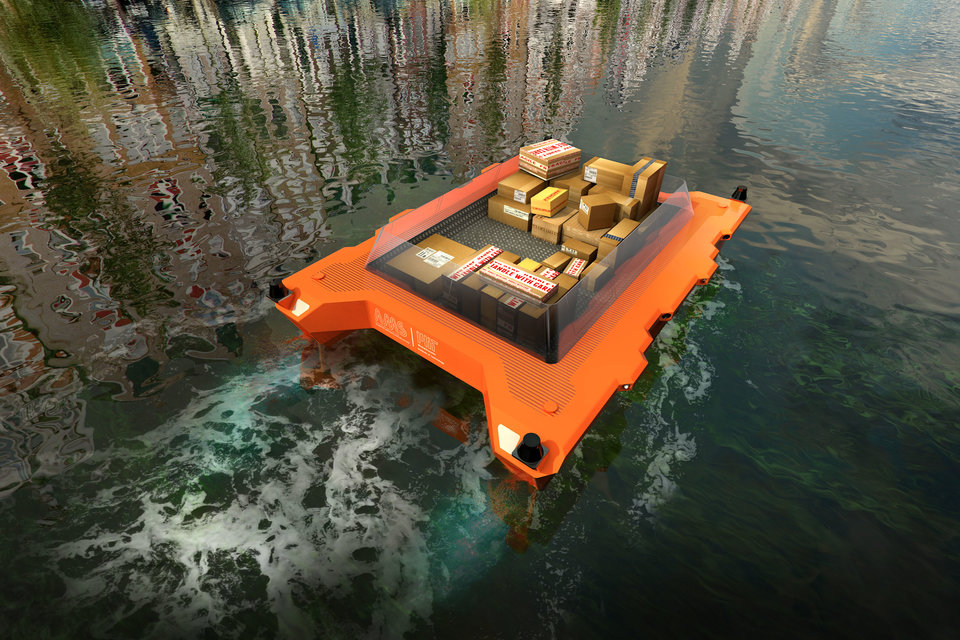
“In a few years’ time, Roboats will be collecting waste in Amsterdam”
“In a few years’ time, Roboats will be collecting waste in Amsterdam” Autonomous boats can help solve a variety of metropolitan challenges By: Jurjen Slump When you think of Amsterdam, you think of canals. So it’s only logical to include the city’s waterways for solutions to challenges faced by the metropolis. One of AMS Institute’s most eye-catching projects is Roboat. In the future, these autonomous boats will be used for numerous applications: from waste collection to inspecting quay walls. ''Roboat is more than a self- driving boat”, says Stephan van Dijk, head of Research and Valorisation at AMS Institute. Van Dijk sees the Roboat as a platform that can be used for all kinds of things. Obviously, you can use it for carrying goods and people. “But you could also line up the boats to build a temporary footbridge. Or use them as a floating stage on the water.” By linking them together, Roboats could also be used to build all kinds of structures. Floating supermarket City planners are excited about the idea, because it adds flexibility to the urban infrastructure. “Today, things still have a fixed place, but in a few decades’ time you may well stumble across a floating market or temporary supermarket on the water.” Inspection of quay walls and bridges is another task for which the autonomous boats could be used. There are more than 200 kilometres of waterways in Amsterdam, and they will require a lot of maintenance in the coming years. At present, there is simply not enough manpower available to inspect all the city’s waterways. But with Roboats, this will happen automatically. During its journey, the boat automatically records its surroundings - bridges, quays, houseboats, obstacles on the water – with LIDAR and stereo- cameras, which can be analysed afterwards by image analysis software. Water quality Or how about measuring water quality? That’s also something that can be easily combined with the other tasks performed by Roboats. They will soon be plying the city’s waterways, enabling the city to accurately monitor surface water quality. This will be done in close collaboration with Waternet. Although many of the applications are still a thing of the future, the project team is actively working on developing use cases where Roboats can be used to collect household waste in the Amsterdam city centre. At present, this is a major problem. “There is hardly any room on the narrow streets of the canals, and we have 17 different waste collection services driving through the city with large trucks, causing traffic jams”, summarises Van Dijk. Moreover, it is very difficult to construct underground containers, because in many cases the quay walls are fragile and unsuitable for this purpose. Floating waste bins A fleet of Roboats could manage those tasks. This works as follows: floating waste bins are moored alongside the quay. Using a smart system, people can throw their waste from the street into the bins, just as they are used to doing now. The waste bin is fitted with a sensor which transmits a signal when the bin is full, and along comes a Roboat which disconnects the waste bin from the quay and takes it to the waste disposal plant. In the meantime, another Roboat arrives with an empty waste bin to replace the full bin. All of this is done at night, because the Roboats are fitted with electric motors and are therefore very silent. “With around forty of these floating waste bins and a few self-driving Roboats, you can dispose of the same waste volumes that we handle today, servicing 1100 households”, says Van Dijk. The Roboats themselves determine the ‘smartest’ route and can have multiple waste bins in tow at a time. This gives us true insight into the issues at hand. As a result, our innovations have a greater chance of succeeding in the market. Because there is a demand for them
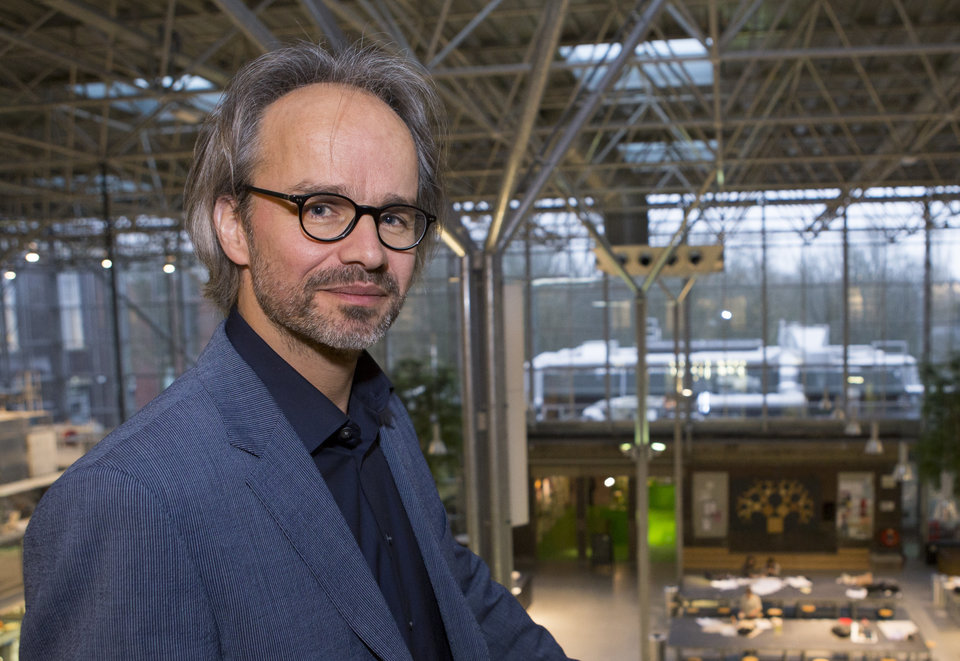
“The traditional models no longer work”
“The traditional models no longer work” Scientific Director Arjan van Timmeren talks about the need for AMS Institute By: Jurjen Slump The increasing complexity of the world around us means that scientific research is also in a state of flux. It has now become necessary for researchers working on metropolitan problems - traffic, climate, energy, sustainability - to start testing their ideas at a much earlier stage than before at the place where the bottlenecks actually occur. In other words, in the big city. The AMS Institute proves that this is the right approach, says Scientific Director Arjan van Timmeren. “The models used by scientists earlier to simulate reality no longer work at all times”, says Van Timmeren. Thanks to the internet, people have become less predictable than before, because they are exposed to many more influences and direct feedback. “Think of traffic jams, for example. Nowadays drivers will look up alternative routes on their phone. The models in general are not yet designed to cope with this.” Double complexity This is what Van Timmeren refers to as the ‘double complexity’: on the one hand, we have urban (technical) systems becoming increasingly complex and, on the other hand, there is real life in cities, with residents not always following the rules of logic. To ensure proper research despite this complexity, it has become necessary to take the laboratory to the city. It is possible to approach the complexity of urban life in a ‘living lab’ if you involve the city residents and other relevant stakeholders such as the city council, water and energy providers, business community, etc. in the research. An additional advantage is that you can test potential applications much faster and refine them in real-life and real-time conditions. This means that you will have a completed product sooner, which can then be launched by either public authorities or for commercial purposes, by a company. The relevance of the work we are doing turns out to be even greater than expected AMS Institute Living Labs Hop, step and jump Living labs key to AMS Institute’s working method Living labs form a crucial link in how the AMS Institute ensures that innovative research benefits society earlier. The institute refers to this innovative research method as the ‘hop, step and jump’ approach: Hop “Together with our most important stakeholders and partners, we draw up a problem analysis of a specific challenge the metropolitan area is facing. At this stage, the scientific research takes place in the laboratories of Wageningen University & Research, MIT and Delft University of Technology.” Step “This is followed by the innovative part of the research process: the results of the first part of the research are tested and validated in a real, ‘living’ environment within the Amsterdam metropolitan area. All parties concerned, including residents, are also involved at this stage. This unique intermediate step forms the basis of the AMS Institute: ensuring that our solutions are aligned more closely with real life in urban environments.” Jump “This enables us to take a bigger leap forward: faster implementation of our solutions in society, as a result of which they will have a bigger impact. This creates sustainable and resilient cities that know how to deal with major societal challenges. Follow us on social media twitter linkedin